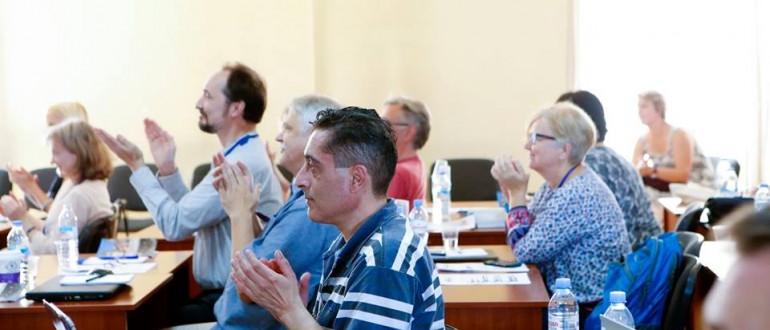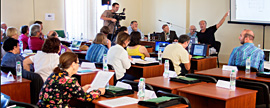|
THE 10th ANNIVERSARY INTERNATIONAL SYMPOSIUM ON TRADITIONAL POLYPHONY 20– 24 October, 2020, Tbilisi, Georgia |
International Research Center for Traditional Polyphony of Vano Sarajishvili Tbilisi State Conservatoire and the International Centre for Georgian Folk Song are pleased to announce that the scholars working on the problems of polyphony are invited to participate in the 10th Anniversary International Symposium on Traditional Polyphony, on 20–24 October, 2020, in Tbilisi, Georgia.
One of the features of the symposium is the diversity of themes, which is allowed by the interdisciplinary character of ethnomusicology.
Official languages of the Symposium are English and Georgian. All the papers will be published after the symposium in both English and Georgian.
Complete information including the history of previous symposia, information on the participants, contents of the bilingual books of proceedings with full texts of all symposium papers and about the International Research Center for Traditional Polyphony of Tbilisi State Conservatoire is provided at the Web Site: www.symposium.polyphony.ge
Topics of the Symposium:
The participants are encouraged to submit abstracts on all aspects of traditional polyphony. The submitted papers will be grouped according to the problems discussed in them and will be presented at the corresponding session. This will allow to better cover the wide range of issues of polyphony.
Alongside the traditional themes, we would like to introduce a special new theme for the 10th symposium:
Polyphony and Rhythm as Manifestation of Human Sociality
Polyphony is an inherently social phenomenon, and the presence of rhythm adds another extremely important dimension to the sociality of human polyphony. We are interested to search the various manifestations of rhythm in human musical culture and human culture in general, such as the phenomenon of dance (group and individual). Did music and dance come to life together or separately? We will ask questions why humans are virtually the only species on our planet that are able to produce and can be entrained in an audio rhythm, why Africans can not imagine music without rhythm and associated dance, why the most ancient human rhythm seems to be based on complex 12/8 beats, We would like to invite expert choreologists to participate in our symposium and we want to ask participants to prepare and bring videos of various interesting/unusual examples of human dances (both group and individual) from various cultures
The other themes are:
- General Theory, History, and Musical-Aesthetic Aspects of Polyphony
This topic considers wide range of general problems of polyphony, characteristic of contemporary cultural anthropology.
- Regional Styles and Musical Language of Traditional Polyphony
This theme unites wide range of regional studies of the polyphonic singing styles of huge regions as well as in-depths studies of a small region, ethnic minority, or even a village.
- Comparative Study of Traditional Polyphony
It is impossible to have a comprehensive understanding of the phenomenon of traditional polyphony without comparative approach. We suggest scholars to work on the development of new methodologies in this direction.
- Sociological Aspects of Traditional Polyphony: Performers and Listeners; Gender, Age, Identity.
Wide range of topics on different aspects of traditional community’s social life is covered under this theme. These problems will be viewed in contemporary life and from the historical perspectives.
- Polyphony in Secular and Sacred Music
This comprises interaction between traditional polyphony and early forms of professional polyphony in various European countries are the main topics of this theme, although the papers dedicated to other regions and time span are also welcome.
- Traditional Instrumental Polyphony
Although central topic of the symposium is vocal polyphony, different aspects of the interaction of vocal and instrumental polyphony might be discussed under this theme
- World Music and Traditional Polyphony
“World Music” expresses the aspiration of different cultures towards harmonization. The idea of “Global Village” testifies to the universal character of music. Interested people study traditional singing on the spot; traditional singers are invited to teach in other countries. What is lost or gained in this process?
Round table: “Traditional Music and Contemporary Society”
The dramatic changes in the habitat and environment caused by globalization have given rise to new forms/ways of functioning to traditional music in present day society. There are newly emerged musical styles combining traditional music with contemporary musical expressions and thus adapting it to the needs of modern society. At the same time, traditional music continues to develop in rural areas, although forms of its representation are tightly connected with trends offered by modern world. Thus, a new phenomenon, such as folk tourism has penetrated rural areas. The discussion of the round table will focus on the challenges or benefits that contemporary environment brings to traditional music, from the perspective of tradition bearers, musicians, ethnomusicologists. Accordingly, we will try to initiate discussion between the representatives of all different roles within traditional music and thus, encourage their future dialogues.
Proposals
The Program Committee encourages submission of individual, panel, poster and
round-table proposals:
- Individual paper will be allotted up to 20 minutes followed by 10 minutes for questions and discussion;
- Panel presentation includes two or three papers, 20 minutes each, followed by 10 minute discussion;
- Poster presenters will be allotted 10 minutes for presentation in Power Point format and 5 minutes for discussion. Poster presenters are kindly requested to bring a prepared 80 cm wide x 100 cm tall poster to the symposium;
- About 2-hour-long Round table session includes not more than four presenters (10 minutes each). The audience is encouraged to participate in the discussion.
Abstracts, CVs and full papers
Abstracts and short CVs – both texts no more than 1800 characters (both should be inserted in the on-line registration form).
The full texts – maximum 7 pages, font New Times Roman, size 12, spacing 1.5.
On-line Registration
On-line registration (Name, Surname, Country, Organization, Position, Email, Title
of the article, Abstract and short Bio) is obligatory for the participation in the symposium.
TIMELINE
The deadline for on-line registration: 15 May, 2020
Notification of the Acceptance: 01 June, 2020
The deadline for submission of full text of papers with the consideration of the time for translation – 01 August, 2020.
Registration fee
For scholars – 80 USD
For student – 30 USD
Accommodation, transportation, cultural program
All the cost of accommodation, as well as cultural program will be borne by the Organizing Committee of the Symposium.
The Organizing Committee plans a day of cultural program for the Symposium participants. Cultural program includes sightseeing in one of Georgia’s regions.
The Tbilisi International Symposium is not only a scholarly discussion of the problems of folk multi-part singing, but is accompanied by a wide spectrum of polyphonic music from Georgia and elsewhere. We expect that, as always, a number of ensembles from around the world will present polyphonic singing at the symposium.
Program Committee
Dr. Rusudan Tsurtsumia (Georgia)
Dr. Joseph Jordania (Australia/Georgia)
Dr. Izaly Zemtsovsky (USA/Russia)
Dr. Nino Makharadze
Dr. Nino Tsitsishvili (Australia/Georgia)
Dr. Daiva Rachiunaite-Vichiniene (Lithuania)
WEATHER IN GEORGIA
Georgia has mild climate, similar to Mediterranean countries. Temperature at the end of October and beginning of November ranges between +10C to +15C.
PRE-SYMPOSIUM/POST-SYMPOSIUM TRIP TO GEORGIAN REGIONS
During past several symposia a new informal tradition had been established.
A group of foreign singers of Georgian songs, together with scholars from various countries, visit rural regions of Georgia. They live in the families of traditional singers for several days, learn traditional polyphonic songs from them and visit the sights and historical monuments. Apart from Svaneti and Samegrelo, we will visit Achara as well. Please mind that there will be two groups (1) PRE-symposium, and (2) POST-symposium trip.
If you have time and are interested to take part in one of these trips, please let us know (better in advance, but you can finalize your plans in the final months before the symposium as well). We usually have 25–35 participants.
DATES: The pre-symposium trip will run from October 7 till October 25. The post-symposium trip will start on November 2 till November 13. Both groups will leave Tbilisi City Centre at 9.00 am. Participants with time constrains can join the trip later, or leave earlier.
FEES: The fee for the trip is easy to work out – each day of the trip costs the participants 50 USD per person. So if you are joining the trip only for four days, you will pay 200 USD, 10 days – 500USD, etc. The fee fully covers everything: transportation (from Tbilisi to Tbilisi), accommodation (with toilets and showers), food, all workshops with traditional singers, visits to glaciers and museums. WHAT TO TAKE: Hiking boots and warm cloths. In Svaneti we expect snow and mild freezing temperatures.
WHO TO CONTACT:
If you are interested to join the pre-symposium trip to three Georgian regions, contact david Robinson (david_robinson@mail.com).
If you are interested to join the post-symposium trip to two Georgian regions, contact Joseph Jordania (josephjordania@yahoo.com.au).
Contact Information for Symposium Participants
Prof. Rusudan Tsurtsumia, E-mail: polyphony@tsc.edu.ge
Dr. Joseph Jordania, E-mail: josephjordania@yahoo.com.au





